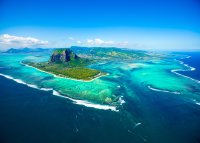SAFETY
As with all travel, it is worth checking your own government’s advice for Mauritius before deciding whether to travel and what precautions to take while travelling. The UK Foreign and Commonwealth Office provides useful advice for travellers as do the US Department of State and the Australian Department of Foreign Affairs and Trade
Although Mauritius enjoys a relatively low crime rate, petty crime is on the increase. Many attribute this to an increase in drug taking. Pickpockets are reported to target tourists in busy areas such as Port Louis market and Grand Baie, whilst self-caterers should be aware of the increase in reports of housebreaking. Visitors should take sensible precautions, including avoiding walking alone at night, not leaving valuables visible in cars and taking care of bags and valuables when walking in towns and tourist areas.
Mid-range, upmarket and luxury hotels typically have robust security arrangements but, as in any country, you should secure any valuables in your hotel safe and always make sure your room is locked. In January 2011, an Irish tourist was murdered in her room on a resort in the north of the island. This was an extremely unusual occurrence and a huge shock to the tourism industry in Mauritius; as such it received a good deal of publicity around the world but is not indicative of an increased threat to tourists from crime.
In 2003, the Police du Tourisme (Tourism Police) was set up to patrol tourist areas and assist local police in the investigation of crimes against tourists. The Tourism Police can often be seen patrolling the beaches in specially marked 4x4 vehicles and they have a hotline number – 213 2818 – for the reporting of incidents.
The Tourism Police publishes a leaflet entitled ‘Spend a safe holiday in Mauritius’. Its advice includes: secure your valuables in the hotel safe, avoid carrying your passport unless needed, do not leave valuables in your car, park your car in well-lit areas, avoid showing large sums of cash in public, do not walk alone at night and ensure service providers hold a valid licence. The leaflet specifies that tourists should check that any provider of boating excursions or watersports holds a pleasure craft licence. The craft should display a registration number preceded by PC for commercial activities, and not PPC (private pleasure craft). A small coastguard service operates in Mauritius and hotel watersports centres are generally well run.
Hawkers operate on many of the island’s beaches and in some towns. You will have no recourse if any items you buy from them are faulty, and please do not buy items made from shells as this contributes to the destruction of the marine environment.
A vast army of dogs wanders the streets and beaches of Mauritius: some are strays but others simply have careless owners. There is always the possibility of confrontation, particularly as they often go around in packs. I was told by a friend living locally that the best defence while walking alone is an umbrella. If a dog with dubious intentions approaches, simply erect the umbrella in its direction and its shield-like appearance should be enough to deter the beast. Take care whilst driving as the roads are not well lit and dogs tend to appear from nowhere.
An increasingly common menace, which my mother and I experienced first hand on our last trip to Mauritius, is the terrifying ‘mugger monkey’. Over the years, the island’s monkeys have come to associate people with food, and in some areas bold monkeys try to intimidate passers-by into handing over an edible bounty by rushing at them, teeth and gums bared. You don’t need to be carrying food to be subjected to this kind of attack. I almost lost my camera bag to a monkey who assumed the bag contained a hidden stash of bananas. Areas where you need to be particularly vigilant to ‘mugger monkeys’ include the Alexandra Falls lookout and Grand Bassin sacred lake.
On one of my visits to Mauritius I met a charming British couple who specifically asked me to write about the dangers of slippery tiles in bathrooms. I met them in a Mauritian hospital – the husband had fallen on wet tiles in the bathroom of an upmarket hotel and broken his leg. As a result, they discovered that there are no regulations requiring non-slip tiles in bathrooms in Mauritius, and, in fact, there are almost no non-slip bathrooms on the island. While many of the hotel bathrooms look spectacular, they are pretty slippery. So, tread carefully.
A relatively new danger is that presented by speedboats and jet skis, which roar along the coasts in front of hotels. There have been reports of swimmers being seriously injured, so be vigilant or stick to marked bathing areas.
Don’t let all this spoil your holiday; simply use common sense and don’t take unnecessary risks.
WOMEN TRAVELLERS
Lone women travellers receive a fair amount of attention from males. It is usually well-meaning curiosity but don’t take chances that you would not take in your home country. For instance, don’t accept a lift from a lone male or group of men. Don’t walk alone at night and try to avoid dimly lit areas, such as beaches. Even during the day, make sure that you are not too isolated on a beach.
Dress standards in Mauritius are conservative. While swimwear is perfectly appropriate on the beach and around the pool, it is not appropriate elsewhere.
Women who are expecting to visit a temple or sacred site should dress appropriately or carry a shawl to cover their shoulders and/or head, if required.














